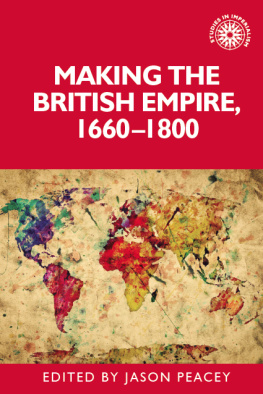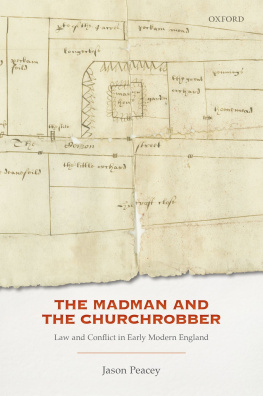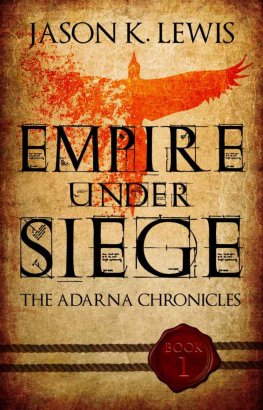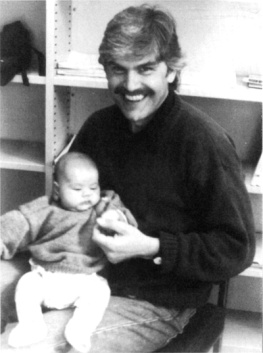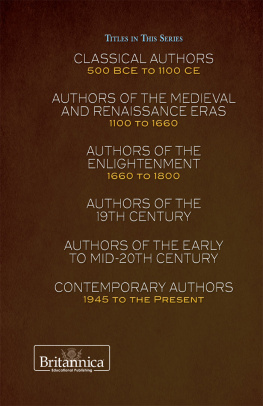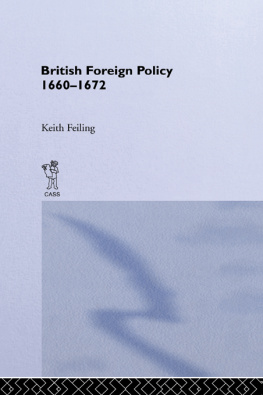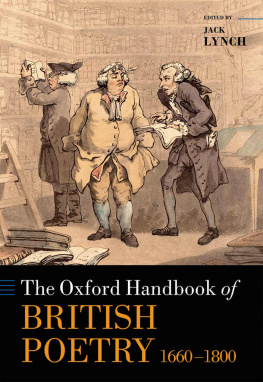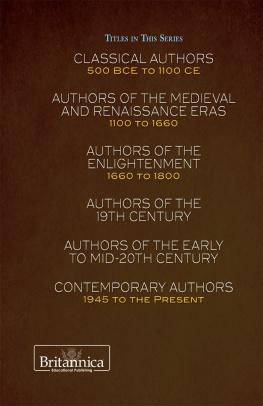
SELECTED TITLES AVAILABLE IN THE SERIES
WRITING IMPERIAL HISTORIES
ed. Andrew S. Thompson
GENDERED TRANSACTIONS
Indrani Sen
EXHIBITING THE EMPIRE
ed. John McAleer and John M. MacKenzie
BANISHED POTENTATES
Robert Aldrich
MISTRESS OF EVERYTHING
ed. Sarah Carter and Maria Nugent
BRITAIN AND THE FORMATION OF THE GULF STATES
Shohei Sato
CULTURES OF DECOLONISATION
ed. Ruth Craggs and Claire Wintle
HONG KONG AND BRITISH CULTURE, 194597
Mark Hampton
Copyright Manchester University Press 2020
While copyright in the volume as a whole is vested in Manchester University Press, copyright in individual chapters belongs to their respective authors, and no chapter may be reproduced wholly or in part without the express permission in writing of both author and publisher.
Published by MANCHESTER UNIVERSITY PRESS
ALTRINCHAM STREET, MANCHESTER M1 7JA
www.manchesteruniversitypress.co.uk
British Library Cataloguing-in-Publication Data
A catalogue record for this book is available from the British Library
ISBN 978 0 7190 8856 8 hardback
First published 2020
The publisher has no responsibility for the persistence or accuracy of URLs for any external or third-party internet websites referred to in this book, and does not guarantee that any content on such websites is, or will remain, accurate or appropriate.
Cover image: Vintage World Map, 2015 Michal Bednarek, bednarek-art.com
Typeset by Sunrise Setting, Brixham
For Annette
CONTENTS
Jason Peacey
Steve Pincus
J. H. Elliott
William J. Bulman
Gabriel Glickman
Leslie Theibert
Philip J. Stern
Julian Hoppit
Eliga H. Gould
Jennifer Pitts
William J. Bulman is Associate Professor of History and Global Studies at Lehigh University. He is the author of Anglican Enlightenment: Orientalism, Religion and Politics in England and its Empire, 16481715 (2015) and co-editor (with Robert G. Ingram) of God in the Enlightenment (2016). He has published articles in Historical Journal and Past and Present.
Sir John Elliott is Regius Professor emeritus of Modern History at the University of Oxford. He has published extensively on the history of Spain, Europe and the Americas in the early modern period. His books include Imperial Spain (1963), Empires of the Atlantic World: Britain and Spain in America, 14921830 (2006) and, most recently, Scots and Catalans: Union and Disunion (2018).
Gabriel Glickman is Lecturer in Early Modern British History at the University of Cambridge. He is the author of The English Catholic Community, 16881745 (2009) and his articles have appeared in Historical Journal, Journal of Modern History, English Historical Review and Journal of British Studies.
Eliga H. Gould is Professor of History at the University of New Hampshire. He is the author of The Persistence of Empire: British Political Culture in the Age of the American Revolution (2011) and Among the Powers of the Earth: The American Revolution and the Making of a New World Empire (2012), and he is co-editor (with Peter S. Onuf) of Empire and Nation: The American Nation in the Atlantic World (2015).
Julian Hoppit is the Astor Professor of British History at UCL. He is the author of Risk and Failure in English Business, 17001800 (1987), A Land of Liberty? England, 16891727 (2000) and Britains Political Economies: Parliament and Economic Life, 16601800 (2017).
Jason Peacey is Professor of Early Modern British History at UCL. He is the author of Politicians and Pamphleteers: Propaganda in the English Civil Wars and Interregnum (2004) and Print and Public Politics in the English Revolution (2014).
Steve Pincus is Thomas E. Donnelly Professor of British History at the University of Chicago. He is the author of Protestantism andPatriotism: Ideologies and the Making of English Foreign Policy, 16501688 (1996), 1688: The First Modern Revolution (2011) and The Heart of theDeclaration: The Founders Case for Activist Government (2016).
Jennifer Pitts is Professor of Political Science at the University of Chicago. She is the author of A Turn to Empire: The Rise of ImperialLiberalism in Britain and France (2005), and Boundaries of theInternational: Law and Empire (2018).
Philip J. Stern is Gilhuly Family Professor at Duke University. He is the author of The Company State: Corporate Sovereignty and the Early Modern Foundations of the British Empire in India (2011) and co-editor (with Carl Wennerlind) of Mercantilism Reimagined: Political Economy in Early Modern Britain and its Empire (2013).
Leslie Theibert completed her PhD at Yale University in 2014, and is currently preparing a book entitled Empires of the Caribbean: Anglo-Spanish Relations and the Origins of the English Empire.
| AHR | American Historical Review |
| BL | British Library |
| Bodl. | Bodleian Library, Oxford |
| BPP | British Parliamentary Papers |
| CJ | Commons Journal |
| CSPC | Calendar of State Papers Colonial |
| EcHR | Economic History Review |
| EHR | English Historical Review |
| ESTC | English Short Title Catalogue |
| HJ | Historical Journal |
| HLQ | Huntington Library Quarterly |
| JBS | Journal of British Studies |
| JEcH | Journal of Economic History |
| JICH | Journal of Imperial and Commonwealth History |
| JMH | Journal of Modern History |
| LPL | Lambeth Palace Library |
| ODNB | Oxford Dictionary of National Biography |
| OED | Oxford English Dictionary |
| P&P | Past and Present |
| TNA | The National Archives, Kew |
| TRHS | Transactions of the Royal Historical Society |
| W&MQ | William and Mary Quarterly |
All dates before 1752 are Old Style unless otherwise indicated, but the New Year is taken to begin on 1 January rather than 25 March.
Unless otherwise stated, London is the place of publication for works printed before 1800.
Jason Peacey
Historians who have reflected on the historiography relating to the British empire have often noted that this particular sub-discipline is not just prone to heart-searching, but is also quarrelsome, and it is common to find references to the tendency to engage in posturing and ill-tempered disputes. In commenting on what he tellingly described as the imperial history wars, Dane Kennedy referred to the risk that some strands within the profession might adopt a smugly self-righteous attitude. It is certainly true that imperial history has witnessed probably in an exaggerated form fairly profound shifts in intellectual fashion, in ways that are perhaps more striking than in other areas of the historical profession. In certain ways, of course, the field has witnessed changes in the fortunes of political, economic, social and cultural history that are entirely familiar across all aspects of the discipline, and that involve fairly predictable anxieties both methodological and conceptual as well as prejudices, some of which may indeed be politically and culturally inspired. At the same time, imperial history might be said to have become rather more acrimonious than most other sub-disciplines for two reasons. The first reflects the particular ways in which some historians have engaged with non-history disciplines in recent decades, notably post-structuralist and post-colonial thought, as well as area studies, literary studies and feminist studies, all of which are sometimes said to involve work that lacks awareness of historical methodology and of historical contexts, and that can also be somewhat impenetrable and jargon-laden. The second reason is that imperial history has been more than usually politicised, for very obvious reasons, given that the profound legacies and repercussions of our imperial past continue to be felt and debated to this day. To some, therefore, historical writing was intimately bound up with modern politics and with national identity, and there can be little doubt that this has had some kind of effect on how the British empire has been studied. However, while these divisions and disagreements can be readily understood, it might also be argued that there has at times been a risk of debates becoming over-heated, and of fault lines becoming widened unnecessarily, and it is possible to argue that there is scope to provide fresh perspectives on at least the history of what is sometimes called the first British empire without the acrimony that has sometimes been present.


